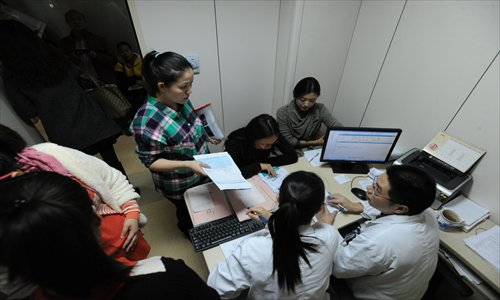HOME >> CHINA
Second time unlucky?
By Hu Qingyun Source:Global Times Published: 2013-12-19 20:33:01

Parents flood into a second child clinic at the Women's Hospital with the School of Medicine of Zhejiang University in Hangzhou, Zhejiang Province, on November 25. Photo: IC
After striving to get up at 4 am, and starting to queue at 6:30 am in the hospital hall, Wang Juan and her husband finally secured an appointment at 10 am with a famous obstetrician at a clinic specializing in second children in Hangzhou, Zhejiang Province.The obstetrician asked thoroughly about Wang's health, including whether, like the majority of Chinese mothers, she gave birth to her first child through a Caesarean.
In a latest decision, the Communist Party of China (CPC) Central Committee allowed couples to have a second child as long as either the husband or the wife is from a one-child family. Previously, the policy required both to be single children.
The easing of the family planning policy delights but also worries Wang, who unlike her husband is an only child. She is the mother of a 3-year-old girl but now yearns for a second child.
"I'm 38 now. I have to consult obstetricians on whether it's OK to do so," said Wang, a white-collar employee in Hangzhou.
Many couples have similar concerns. Several hospitals have launched special departments to offer consultations on having a second child since the new policy was announced in November.
Although Chinese people have shown great desire for a larger family, medical specialists worry about the health of older mothers.
Clinical boost
Most Chinese provinces and regions have yet to officially release new policies, but hospitals have been besieged by middle-aged couples seeking advice on new pregnancies following the announcement.
Li Jiafu, an ob/gyn specialist with the Zhongnan Hospital of Wuhan University in Central China's Hubei Province, told the Global Times that the number of patients coming for consultations has doubled since the announcement.
Although second child consultation seemed to getting more popular across the country, Li still thought it was not necessary to set up special clinics.
"Such clinics offered very similar service to normal obstetrics and gynecology department in many hospitals. I think some hospitals use it as a stunt to attract more attention," Li said.
The Hangzhou-based Women's Hospital with the School of Medicine of Zhejiang University launched the first "second child clinic" in China on November 27, only 12 days after the CPC announced its reform decision.
The clinic is open for half a day a week and the specialists would only meet 15 to 20 parents in order to ensure quality service, a staff member from the publicity department of the hospital told the Global Times on condition of anonymity.
Due to a limited number of appointments and increasing patients, people have to start to queue in the small hours of the morning, and the consultation costs 50 yuan ($8.20) each time, the staff member said.
"Doctors ask various details about the patients' lifestyle and health condition, which are related to their potential pregnancy and childbirth, even including whether they have dogs," she added.
Following the lead of the hospital in Hangzhou, a hospital in Jinhua, another city in Zhejiang Province, also set up a similar clinic on December 4, which is open from Monday to Friday.
Central China's Hunan Province opened its first such clinic in Changsha Maria Maternity Hospital on December 8, and claimed that it would "customize" the pregnant plan for each patient.
Older mothers
Lin Huimin, a 40-year-old mother of a 5-year-old boy from Liuzhou, Guangxi Zhuang Autonomous Region, told the Global Times that she worries she can't get pregnant again.
"The anxiety worried me as my family are eager to see me having a second child, but I still can't make the decision yet," Lin said.
The majority of women seeking for advice from the second child clinic are over 35, the staff member from the Hangzhou hospital said.
According to the sixth national census carried out in 2010, the average age for first childbirth is about 29 years old for Chinese women.
A staff member from the hospital in Changsha, surnamed You, told the Global Times that their second child clinic provides psychological counseling classes for patients who are over 35 years old to overcome the fear of infertility.
"Such anxiety can cause a vicious cycle, which would make it very hard for a woman to get pregnant," she said.
Shangguan Xuejun, a doctor from the Hangzhou clinic, told news portal zjol.co.cn in November that they would suggest potential parents check their reproductive endocrine system, ovarian function and uterus condition before pregnancy.
But with nearly half of Chinese mothers delivering via Caesarean, some are also worried that their previous operations might jeopardize their chances of having a second child.
Wang Juan was not very happy after meeting the doctor, as the doctor pointed out that her previous C-section might bring dangers if she wants to get pregnant again.
"We had never considered of having another baby before the new policy because my husband has siblings. As I was afraid of the pain of natural childbirth, I had the operation," said Wang.
"The scars left on the uterus are likely to lead to trouble for future pregnancy and delivery," Li said, adding that it might be an unbeatable obstacle for some couples. The Hangzhou clinic has suggested that parents who anticipate two children should steer clear of C-sections.
China ranks No.1 in the world for Caesarean births, at 46 percent, Xinhua News Agency reported Monday.
The difficulty of the choice may be deterring parents from actually making the formal application for their second child. Zhoushan, also in Zhejiang Province, was the first city in China to kick off applications following the new policy. Chinanews.com reported on December 4 that only 21 applications have been received since the application process started on November 23, far fewer than expected.
Posted in: Society